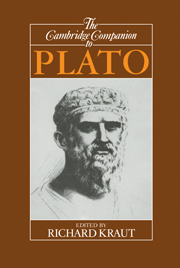Book contents
- Frontmatter
- 1 Introduction to the study of Plato
- 2 Plato
- 3 Stylometry and chronology
- 4 Socrates and the early dialogues
- 5 Mathematical method and philosophical truth
- 6 Inquiry in the Meno
- 7 Plato and Greek religion
- 8 Platonic love
- 9 Plato's metaphysical epistemology
- 10 The defense of justice in Plato's Republic
- 11 Plato on poetic creativity
- 12 Good-bye to the Third Man
- 13 Plato's Sophist on false statements
- 14 Disintegration and restoration
- 15 Plato's later political thought
- Bibliography
- Index
9 - Plato's metaphysical epistemology
Published online by Cambridge University Press: 28 May 2006
- Frontmatter
- 1 Introduction to the study of Plato
- 2 Plato
- 3 Stylometry and chronology
- 4 Socrates and the early dialogues
- 5 Mathematical method and philosophical truth
- 6 Inquiry in the Meno
- 7 Plato and Greek religion
- 8 Platonic love
- 9 Plato's metaphysical epistemology
- 10 The defense of justice in Plato's Republic
- 11 Plato on poetic creativity
- 12 Good-bye to the Third Man
- 13 Plato's Sophist on false statements
- 14 Disintegration and restoration
- 15 Plato's later political thought
- Bibliography
- Index
Summary
For some time philosophers have thought of epistemology and metaphysics as different branches of philosophy, investigating, respectively, what can be known and the basic properties and nature of what there is. It is hard, though, to see any genuine boundary here. The issues irresistibly overlap. Certainly in Plato there is no such divide. His views about what there is are largely controlled by ideas about how knowledge can be accounted for, and his thinking about what knowledge is takes its character from convictions about what there is that is knowable. As a result his doctrines have a different shape from characteristically modern ones.
Some earlier Platonic writings do have a somewhat modern look. Socrates was notorious for having questioned whether he knew much of anything, and for making people hesitant about their opinions (Meno 80c, 86b-c). c). Plato exploits this side of Socratic thought. The namesake of the Euthyphro judges that an action of his is pious. Socrates wonders whether Euthyphro ought to be confident about that judgment, and tries to make him less so. Elsewhere Socrates raises questions concerning his own judgments about which things are beautiful (H. Ma. 286c). Such questions seem to suggest a general policy of doubting, reminiscent to us of Descartes or of the various programs of ancient skepticism. In Socrates' efforts to overcome ignorance (Meno 86b-c) we might see a project of justifying beliefs like that of typical contemporary epistemologists.
- Type
- Chapter
- Information
- The Cambridge Companion to Plato , pp. 277 - 310Publisher: Cambridge University PressPrint publication year: 1992
- 14
- Cited by

